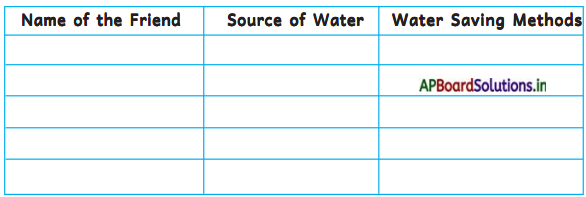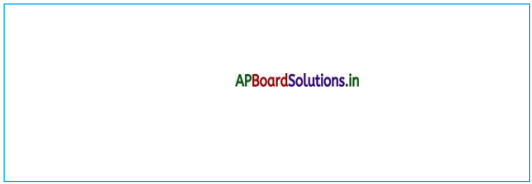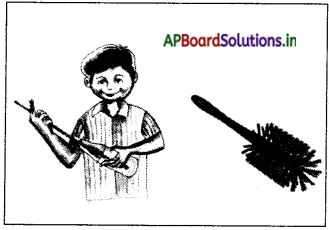Andhra Pradesh AP Board 3rd Class EVS Solutions 6th Lesson Water – The Gift from Nature Textbook Exercise Questions and Answers.
AP State Syllabus 3rd Class EVS Solutions Lesson 6 Water – The Gift from Nature
I. Conceptual Understanding:
Question 1.
What are the uses of water in our daily life ?
Answer:
We use water in our daily life for many purposes such as drinking, cleaning, washing, bathing, cooking and watering.
We also use water to put off fire, agriculture, aquaculture and constructions.
Question 2.
What happens if there is no water ?
Answer:
- If there is no water, there would be no life on earth, water is the most important component of life and it is needed by us in many ways.
- All living things may die (plants and animals)
- There would be no agriculture if there is no water.
Question 3.
Give a few examples of water resources.
Answer:
- Water resources are the sources of fresh water that are useful for humans or society.
- Some examples of water resources are ground water, rivers, lakes and reservoirs.
![]()
II. Questioning and Hypothesis:
Question 4.
How can you save water ?
Answer:
I can save water by following some steps. They are
- We use small glass to drink water.
- I wash fruits and vegetables in a bowl of water and not under running tap water.
- Turn off the taps immediately after using water for brushing, washing clothes, taking bath etc.
- Check the pipes for leaks.
- Turn off the motor when tank is full.
Question 5.
What questions would you ask your parents to know about the water sources in the olden days ?
Answer:
I will ask my parents following questions to know about water sources in olden days.
- How did people get fresh water in olden days ?
- What are some ancient water supply systems.
- How was water used in the past.
III. Experiments & Field Observations:
Question 6.
Visit a protected fresh water scheme in your village and observe how water is supplied and the steps taken to supply. Say / write.
Answer:
- The protected fresh water schemes in our villages follow water treatment steps like purification, disinfection through chlorination.
- Water supply systems gets water from various sources of water like ponds, rivers, lakes followed by purification, disinfection.
![]()
IV. Information Skills & Project Work:
Question 7.
Collect information from your friends about how they save water ?

Answer:
Student Activity.
V. Drawing Pictures and Model Making:
Question 8.
Draw a picture of a bottle brush and say how to use it.

Answer:
Student Activity.

Put a pinch of salt in a bottle and pour some water then keep bottle brush in it and move it up and down and wash the bottle property.
VI. Appreciation, values and creating awareness towards bio-diversity:
Question 9.
One day Devi was going to her friend’s house to play, on the way she saw some children wasting water at a bore pump. What might have Devi told them / What would you do if you were there ?
Answer:
Devi might have told them about the importance of water, and told not to waste water.
- If I was there I will try to create awareness not to waste water.
- I will stick some slogans there not to waste water.
![]()
Additional Questions:
Conceptual Understanding:
Question 1.
What are the natural sources of water ?
Answer:
Oceans, rivers, lakes, streams, ponds and springs are natural sources of water. Rain is the main source for all these natural sources of water.
Question 2.
What are man-made sources of water ? Give examples.
Answer:
Man made sources of water are those sources of water that can be made by man from the natural sources of water.
Examples are Dams, Wells, Tubewells, Handpumps canals etc.
Question 3.
How the water gets polluted ? How can we purify water ?
Answer:
Water gets polluted due to human activities such as cleaning and washing in the sources of water. Water gets purified by boiling and cooling before drinking. We can also purify water by using water filters and purifiers.
Question 4.
In recent past, “Water bell” was introduced by the Answer:P. Govt, in schools. What is the aim of it ?
Answer:
AP govt, has introduced a special bell that rings three times a day, that is “waterbell” which aims at encouraging students to drink sufficient water during the day to stay hydrate and fit.
![]()
II. Appreciation, values and creating awareness towards bio-diversity:
Question 5.
Write two slogans on ‘save water’.
Answer:
Sologans on save water.
- “Save water – save future”.
- “Water is life so don’t hit your life.
Question 6.
What should be done to stop wastage of water ?
Answer:
- Create awareness not to waste water.
- Put up slogans not to waste water.
- We should not allow water to overflow.
- We should turn off the tap before water over flows from the vessel.
![]()
Multiple Choice Questions:
Question 1.
_______ is the main source of water.
a) Trees
b) Rain
c) Rivers
d) None
Answer:
b) Rain
Question 2.
_______ of the earth is covered with water
a) Three parts
b) Two parts
c) Four parts
d) None
Answer:
a) Three parts
Question 3.
International water day is on
a) 22nd March
b) 5th June
c) 22nd January
d) none
Answer:
a) 22nd March
![]()
Question 4.
“Water bell” rings _______ times a day.
a) one time
b) two times
c) three times
d) none
Answer:
c) three times
Question 5.
Oceans, rivers, lakes are _______ sources of water.
a) man made
b) natural
c) both a & b
d) none
Answer:
b) natural
Question 6.
Water get polluted due to _______.
a) nature
b) human activities
c) trees
d) none
Answer:
b) human activities
![]()
Question 7.
_______ is the water purifying methods.
a) Boiling
b) Filtering
c) Chlorination
d) All the above
Answer:
d) All the above
Question 8.
Drink _______ water only.
a) safe
b) polluted
c) distilled
d) none
Answer:
a) safe
Question 9.
_______ are the fresh water sources.
a) Rivers
b) Lakes
c) Ground Water
d) All
Answer:
d) All
![]()
Question 10.
_______ of the following are man made sources of water.
a) Dams
b) Wells
c) a & b
d) None
Answer:
c) a & b